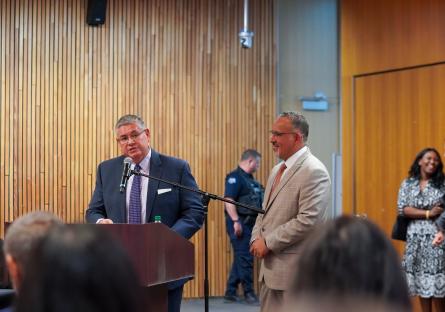
On May 31, the Maricopa County Community College District (MCCCD) and South Mountain Community College (SMCC) were honored to welcome the U.S. Secretary of Education Dr. Miguel A. Cardona and Assistant Secretary for Special Education and Rehabilitative Services Glenna Wright-Gallo to SMCC. The visit highlighted MCCCD’s commitment to addressing Arizona’s behavioral health workforce needs through the expansion of behavioral health programs.
During the visit, Dr. Cardona provided welcome remarks for the morning’s roundtable discussion, which was led by Assistant Secretary Wright-Gallo and included Dr. Richard Daniel, President of SMCC; Dr. Thomas Aubrey, SMCC Director and Division Chair of Behavioral Sciences; Dr. Trish Hernandez, Rio Salado College (Rio Salado) Chemical Dependency Division Chair; Dr. Debbie Webster, Phoenix College (PC) Psychology faculty member; Liahla Ferra, MCCCD Sr. Project Manager for Healthcare Education; and MCCCD students. The discussion focused on the importance of behavioral health programs, including SMCC’s bachelor’s in Behavioral Sciences and how MCCCD’s ten colleges are addressing the needs of Arizona’s communities and workforce.
“We are honored to have Dr. Cardona visit South Mountain Community College and see firsthand the impact of our behavioral health programs,” said Dr. Lisa Armour, MCCCD Executive Vice Chancellor, and Provost. “As a leader in regional workforce development, MCCCD is dedicated to providing our students with the education and resources needed to build a better community and a better world. As we look ahead, specifically to our healthcare program offerings, we hope to expand microcredential pathways in behavioral health and direct-care work this fall to help meet critical workforce needs.”
MCCCD has been at the forefront of expanding behavioral health programs in Arizona through strategic partnerships and funding initiatives, including:
- In collaboration with Arizona’s Health Care Cost Containment System (AHCCCS), MCCCD is leading a statewide effort with Arizona’s ten community college districts to enhance the development of the state’s long-term care and behavioral health workforces.
- MCCCD and Northland Pioneer College (NPC) are spearheading a statewide Healthy Practices Program to provide comprehensive support to behavioral health Home and Community Based Service students, faculty, staff, and workforce. This partnership also includes a pathway program for NPC students to seamlessly transfer to SMCC’s Behavioral Sciences Baccalaureate Degree program.
- Funding from AHCCCS has allowed MCCCD to expand behavioral health programs at Glendale Community College, Mesa Community College, PC, Rio Salado, and SMCC.
- SMCC marked a milestone with the graduation of four students receiving the college’s first-ever bachelor’s degrees in Behavioral Sciences.
“We are extremely honored to have Secretary Cardona visit the Maricopa Community Colleges today to highlight our workforce development programs and expansion of behavioral health sciences for our student population,” Governing Board President Susan Bitter Smith said. “The partnership we have with the Department of Education is unparalleled and their commitment to continue partnering with us is critical to the growth of Maricopa County,” President Bitter Smith continued. “We remain committed to leveraging these partnerships and resources to give our students the opportunity to thrive in the next chapter following their educational experience.”
During the SMCC Free Application for Federal Student Aid (FAFSA) workshop, Dr. Cardona and SMCC financial aid experts met with over 20 students and families, taking time to sit with students, answer questions, and provide assistance as they completed their applications.
As Arizona’s largest workforce development training provider, Maricopa Community Colleges, with ten colleges and 31 satellite locations strategically positioned throughout the Valley, is providing accessible, cost-effective, and high-quality education and training for the state’s behavioral science and human services industry. Learn more at Maricopa.edu.